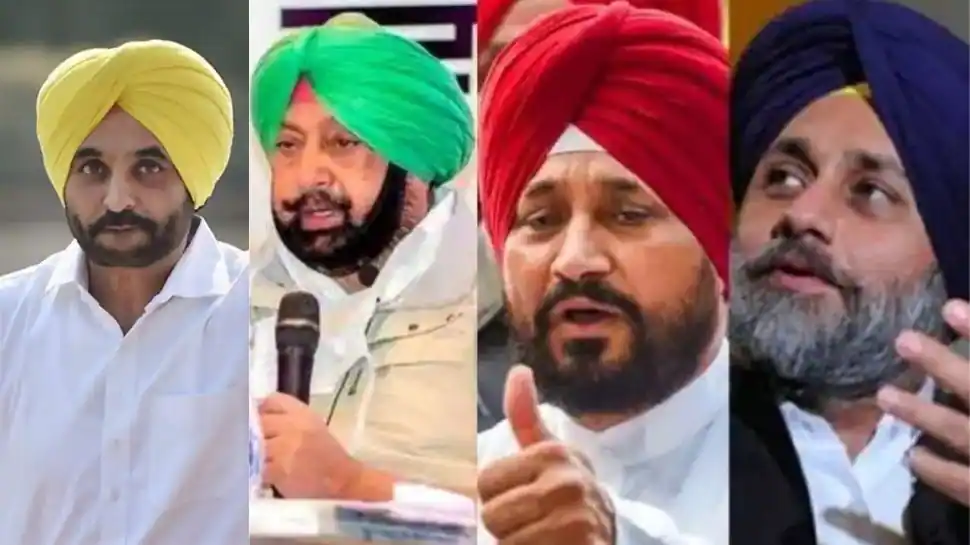New Delhi: Voting for single-phase Punjab Assembly election for 117 seats was held on Sunday (February 20). In Punjab’s multi-cornered fight, Congress, Aam Aadmi Party (AAP), SAD-BSP alliance, BJP-PLC-SAD (Sanyukt) are the main players in the fray.
If we go by some reports, it seems Punjab voters are keen to give Aam Aadmi Party (AAP) a chance this time. Sources say that many Punjab voters feel that they have given a chance to both Congress and Shiromani Akali Dal, however, their problems have remained unresolved. So why not AAP for once, they ask. From Chowk crossroad to the polling booth, the wave seemed in favour of the AAP, as per sources.
After analysing voters’ moods, two scenarios seem likely when the results for Punjab polls get announced on March 10. First, it’s possible that AAP will form a government with a majority. Second, it might be a hung assembly, requiring a coalition. But even then, sources say, AAP is likely to emerge as the single largest party.
As far as Congress is concerned, it is expected the grand old party will become the second largest party. It is also being predicted that incumbent Chief Minister Charanjit Singh Channi will lose one of the two seats – Chamkaur Sahib (SC) and Bhadaur – he was fielded from, while there is uncertainty about Punjab Congress president Navjot Singh Sidhu’s performance. Sidhu contested from Amritsar East Assembly constituency. It is also believed, say sources, that if election was held under the leadership of Captain Amarinder Singh, then Congress would have fared worse. It seems Channi managed to revive Congress in a short time of over 100 days.
Meanwhile, even though allegations about Arvind Kejriwal’s links with Khalistan have hurt the AAP, the party in all probability had weathered the storm this time. In the 2017 election, the reports of Bhatinda blast and Kejriwal’s stay at a separatist’s house emerged around 20 days before the polling, leading to the opposition parties getting more time to campaign against him. In 2022 polls, the impact of this issue has been less visible. AAP is however also likely to suffer a loss due to Dera chief Gurmeet Ram Rahim’s appeal to electors to cast votes in favor of BJP and Akali.
Area-wise projection
Punjab is divided into three regions — Malwa has 69 seats, Manjha 25 and 23 Assembly seats fall in the Doaba region. In 2017 polls, AAP had bagged 20 seats from the Malwa region. If the Aam Aadmi Party is successful in winning a good number of seats in the Manjha and Doaba regions, then it will comfortably form the next government in Punjab; otherwise, the state will witness a hung assembly, say experts.
Punjab voters are against a hung assembly as many people have expressed disappointment with the Modi government due to the year-long farmers’ agitation. They do not want the Centre’s rule in Punjab through President’s rule at any cost. Notably, Punjab has always had a majority government, except post the 1967 and 1969 elections.
Caste-wise distribution of votes
Punjab has about 35 per cent Dalit voters. As Charanjit Channi is a Dalit, Congress is likely to get the lion’s share when it comes to Dalit vote back. Meanwhile, Arvind Kejriwal’s party has also claimed to have come to power with the help of the Dalit voter base. Among Dalit voters, 60% are expected to vote for Congress and 40% for AAP.
The 20% Jat-Sikh electors will vote for AAP, Akali Dal, or Congress according to different areas and candidates, say experts. It is believed that Jat-Sikh voters’ first choice is the AAP because of its CM candidate Bhagwant Mann. Akali is likely to be the second choice among the Jat-Sikhs, followed by Congress.
The Hindu votes are largely expected to be in BJP’s favour. While AAP has also been making a dent in the Hindu voter base, however, the allegations of Kejriwal’s relations with separatist forces seems to have adversely affected the mood of the Hindu voters.
After analysing the voter’s pulse in Punjab today, experts say that it can be said that either the AAP will form the next government or Punjab will see a hung Assembly. The chances of Congress making a comeback seems very less.
Live TV













